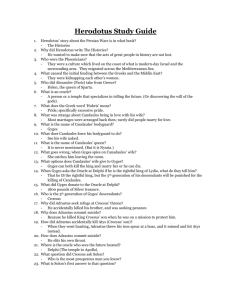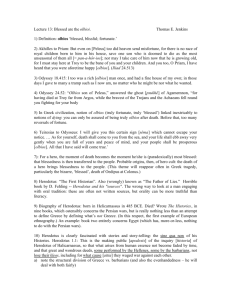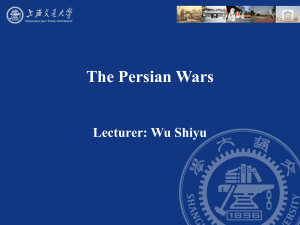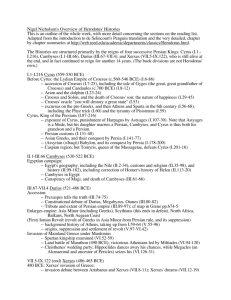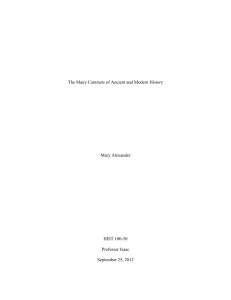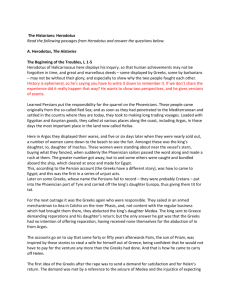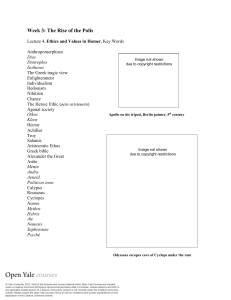Study Guide for Herodotus Book I:
advertisement
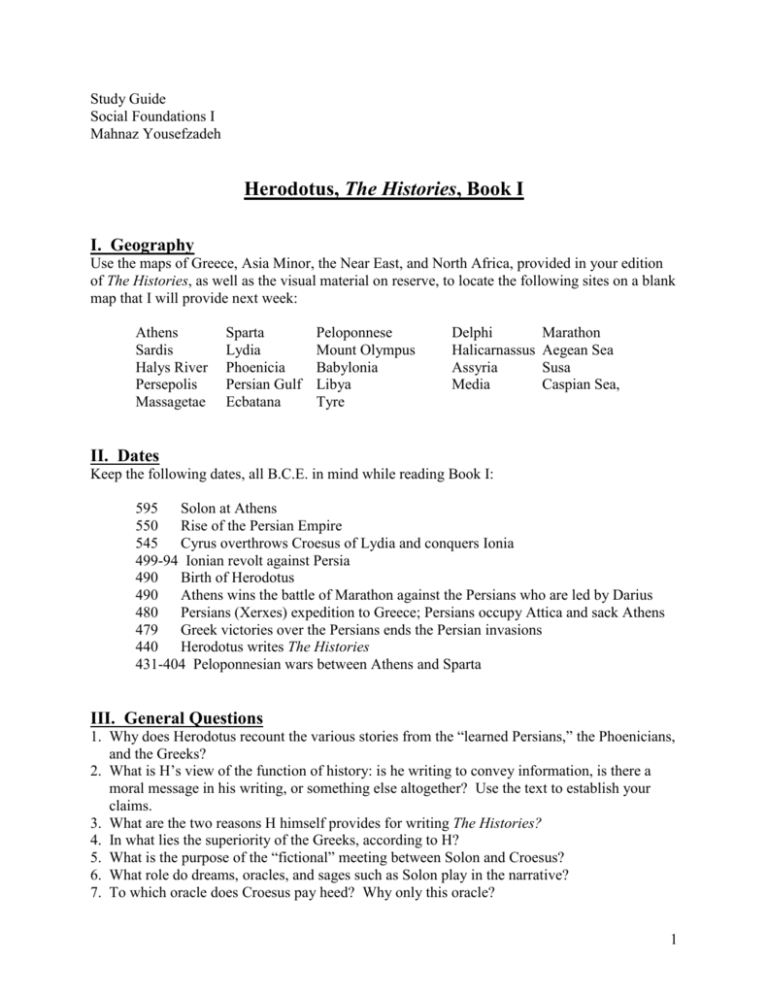
Study Guide Social Foundations I Mahnaz Yousefzadeh Herodotus, The Histories, Book I I. Geography Use the maps of Greece, Asia Minor, the Near East, and North Africa, provided in your edition of The Histories, as well as the visual material on reserve, to locate the following sites on a blank map that I will provide next week: Athens Sardis Halys River Persepolis Massagetae Sparta Lydia Phoenicia Persian Gulf Ecbatana Peloponnese Mount Olympus Babylonia Libya Tyre Delphi Halicarnassus Assyria Media Marathon Aegean Sea Susa Caspian Sea, II. Dates Keep the following dates, all B.C.E. in mind while reading Book I: 595 Solon at Athens 550 Rise of the Persian Empire 545 Cyrus overthrows Croesus of Lydia and conquers Ionia 499-94 Ionian revolt against Persia 490 Birth of Herodotus 490 Athens wins the battle of Marathon against the Persians who are led by Darius 480 Persians (Xerxes) expedition to Greece; Persians occupy Attica and sack Athens 479 Greek victories over the Persians ends the Persian invasions 440 Herodotus writes The Histories 431-404 Peloponnesian wars between Athens and Sparta III. General Questions 1. Why does Herodotus recount the various stories from the “learned Persians,” the Phoenicians, and the Greeks? 2. What is H’s view of the function of history: is he writing to convey information, is there a moral message in his writing, or something else altogether? Use the text to establish your claims. 3. What are the two reasons H himself provides for writing The Histories? 4. In what lies the superiority of the Greeks, according to H? 5. What is the purpose of the “fictional” meeting between Solon and Croesus? 6. What role do dreams, oracles, and sages such as Solon play in the narrative? 7. To which oracle does Croesus pay heed? Why only this oracle? 1 8. Which key statement of the oracle does Croesus misinterpret? 9. List two military strategies used by Cyrus to defeat Croesus? 10. Is Croesus’s downfall “fated” or does he cause it himself? 11. Before Croesus is about to burn, who calls out to save him? What is odd about this call? 12. Why, during the Croesus burning scene, are men unable to put out the fire, who puts it out, and why is this significant? 13. What role does Croesus play in Cyrus’s government? 14. Note three pieces of advice that Croesus offers Cyrus. 15. How does Herodotus generally organize all the stories, legends, and bits of information he has chosen to recount? a. Is there a main narrative with tangents? b. Give examples of one main narrative and one tangent. IV. Discussion Topics Come to class prepared to discuss the following topics, noting that the citations in Section V below may assist you: 1. When is Herodotus writing, and why is that important? Who is his audience? Why does he say he is writing? What does he think is the role, function, and value of history? Please refer to John Marincola’s Introduction as well as Book I itself. 2. Pay particular attention to the ways Herodotus handles his sources: what sources does H use to write his history? How does he handle them? How much distance does he put between himself and his sources? Identify the various sources under the following headings: a. myth b. fables c. fictions d. oral testimony e. material documents f. physical objects. 3. Offer one example of the following, paying special attention to each time H supports his story by referencing the existence of some sort of material evidence: a. H gives several versions of a story without taking sides b. H explicitly states he believes one version more than another c. H indicates that he has heard a story but will not recount it here 4. How does H account for historical causation? Name instances where H’s text discusses causation specifically. What causes historical events to occur: human hubris, fate, the Gods, something else? Also, look for examples where H suggests that major historical proceedings result from very small—seemingly trite and mundane— human acts and events. 5. What principal moral message does Herodotus convey? What rhetorical devices does he use to convey it? 2 V. Helpful Citations Prologue: “Herodotus of Halicarnassus here displays his inquiry so that human achievements may not become forgotten in time, and great and marvelous deeds—some displayed by Greeks, some by barbarians—may not be without their glory; and especially to show why the two peoples fought with each other.” I. 5: “So much for what Persians and Phoenicians say; and I have no intention of passing judgment on its truth or falsity. I prefer to rely on my own knowledge, and to point out who is was in actual fact that first injured the Greeks; then I will proceed with my history, telling the story as I go along of small cities of men no less than of great in my own time. Knowing therefore, that human prosperity never abides long in the same place, I shall pay attention to both alike.” I. 49: “So much for the answer from Delphi. As to the oracle of Amphiaraus, there is no record of what answer the Lydians received when they had performed the customary rites in the temple; all I can say, is that Croesus believed this oracle to be in possession of the truth.” I. 60: “…they devised between them what seems to me the silliest trick which history has to record. The greeks have never been simpletons; for centuries past they have been distinguished from other nations by superior wits.” I. 75: “When he reached the Halys, he crossed it by the existing bridge; that, at any rate, is my own belief in spite of the common Greek story that it was Thales of Miletus who contrived the crossing. The tale supposes that the bridge had not yet been built, and that while Croesus was wondering how his men were to get across, Thales, who was in camp with them, made the river flow on both sides of the army instead of only on the left… Some say that the original river-bed was completely dried up; but I do not believe this—for had it been so, how would they have crossed on their return journey?” I. 131: “The following are certain Persian customs which I can describe from personal knowledge…” I. 140: “all of this I am able to state definitely from personal knowledge.” I. 32: “’I know God is envious of human prosperity and likes to trouble us.’” I. 86: “The oracle was fulfilled; Croesus had destroyed a mighty empire—his own.” I. 73: “Croesus had a craving to extend his territories, but there were two other reasons for his attack on Cappadocia: namely his trust in the oracle and his desire to punish Cyrus for his treatment of Astyages. Astyages, son of Cyaxares and king of Media, was Croesus’ brother-inlaw, and had been dethroned by Cyrus, son of Cambyses.” 3 I. 80: “The reasons for confronting the Lydian cavalry with camels was the instinctive fear which they inspire in horses. No horse can endure the sight or smell of a camel. This is the fact upon which the stratagem was based, and its object was to render useless Croesus’ cavalry, the very arm in which the Lydians expected to distinguish themselves. The ruse succeeded, for when the battle began, the horses turned tail the moment they smelt and saw the camels – and Croesus’ chief ground of confidence was cut from under him.” I. 34: “After Solon’s departure nemesis fell upon Croesus, presumably because God was angry with him for supposing himself the happiest of men. It began with a dream he had about a disaster to one of his sons: a dream which came true.” I. 91: “It is said that when the Lydian messengers reached Delphi and asked the questions they had been told to ask, the priestess replied that not God himself could escape destiny. As for Croesus, he had expiated in the fifth generation the crime of his ancestor, who was a soldier in the bodyguard of the Heraclids, and, tempted by a woman’s treachery, had murdered his master and stolen his office, to which he had no claim. The god of Prophecy was eager that the fall of Sardis might occur in the time of Croesus’ sons rather than in his own, but he had been unable to divert the course of destiny. Nevertheless what little the Fates allowed, he had obtained for Croesus’ advantage: he had postponed the capture of Sardis for three years, so Croesus much realize that he had enjoyed three years of freedom more than was appointed to him. Secondly, the god had saved him when he was on the pyre. As to the oracle, Croesus had no right to find fault with it: the god had declared that if he attacked the Persians he would bring down a mighty empire. After an answer like that, the wise thing would have been to send again to inquire which empire was meant, Cyrus’ or his own. But as he misinterpreted what was said and made no second inquiry, he must admit the fault to have been his own. Moreover, the last time he consulted the oracle he failed also to understand what Apollo said about the mule. The mule was Cyrus, who was the child of parents of different races—a nobler mother and a baser father.” I. 5: “I shall move forward in my account, describing alike the small and large cities of humankind; for those that were formerly large have for the most part become small, and those that were large in my lifetime were formerly small. Understanding that human happiness never resides in the same place, I shall mention both alike.” I. 32: “One must look at the end of every matter, how it will turn out; for the god has shown a glimpse of happiness to many men, then destroyed them root and branch.” I. 207: “…but if you recognize that you, too, are human, and you command others like yourself, then above all heed this: There is a wheel of human affairs, and as it spins around it does not always allow the same men to succeed.” 4

